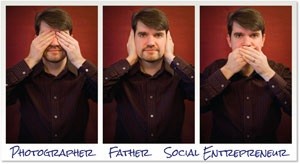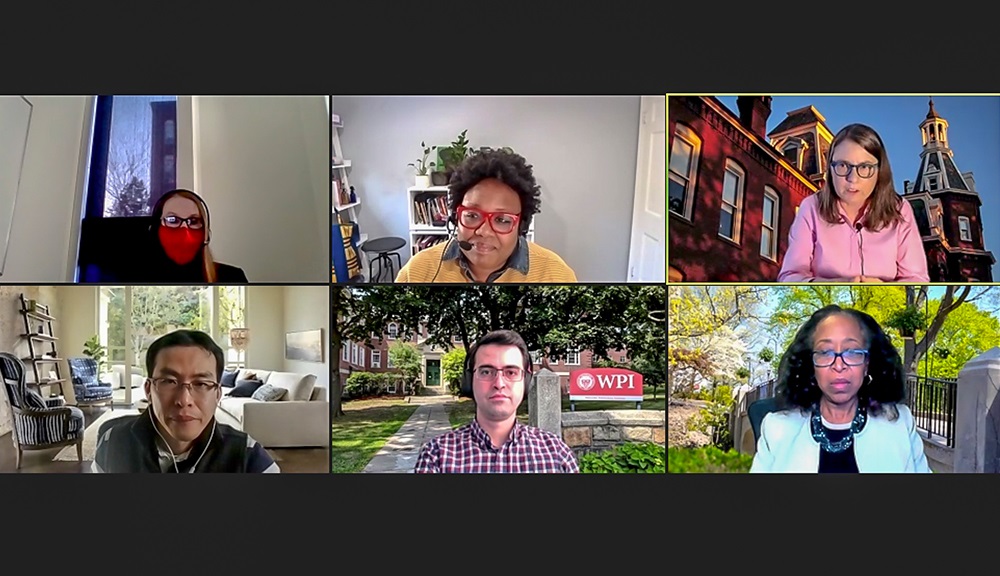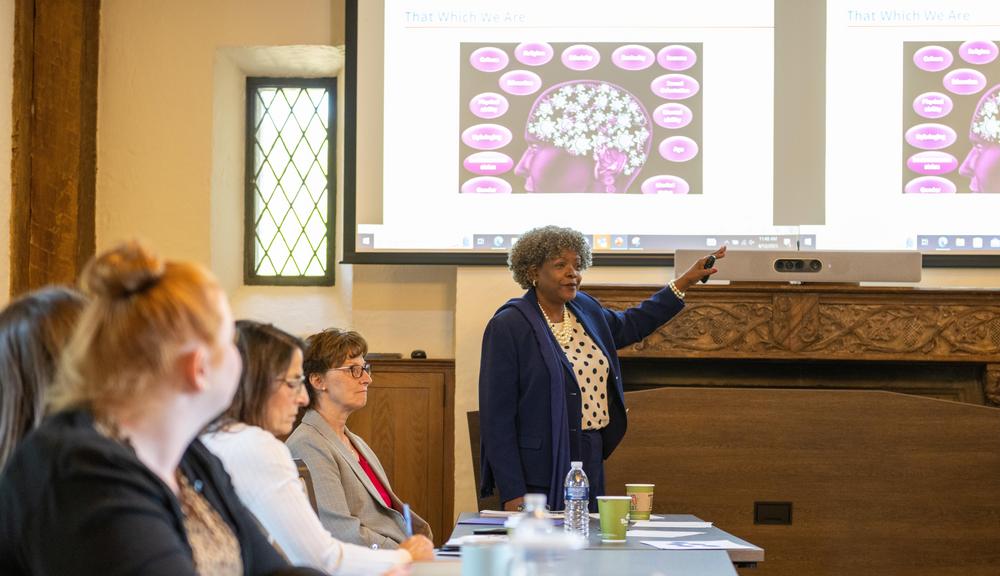Participants stopped in to register and choose from a lengthy list of labels they wanted to attach to themselves. They also answered questions about good deeds they do and why they were participating in the No Evil Project. Finally, they had their photos taken, with three funny poses mimicking the motions of “see no evil, hear no evil, speak no evil.”
“I pictured this as a simple, silly thing,” says Thompson. He would have people make goofy poses and talk about themselves and their good deeds. But what happened was unexpected. “People thought about, ‘well, what are my labels?’” says Thompson. “Then they thought, ‘I wonder what other people think my labels are?’ and then that turned into, ‘Hmm, how do I label other people?’ There are so many layers to this.”
Thompson’s first public display of the No Evil Project was on a grand scale at the Hanover Theatre in downtown Worcester. The No Evil Project has since found approximately 5,000 participants at universities, high schools, Worcester’s stART on the Street festival, and at tattoo booths. Thompson has even had interest from retirement communities, where the close living quarters of many diverse people can lead to stereotyping and misunderstandings based on assumptions.
 Girouard admits it was harder than she thought it would be to pick three labels for the world to see. Choosing from a lengthy list that includes words as diverse as fashionista, emo, metalhead, pagan, cutter, New Yorker, stutterer, woodworker, sober, punk, Red Sox fan, rape survivor, queer, Taurus, and nerd is an immediate and unexpected exercise in self-reflection for participants. Some of the choices offered are silly, but others can reveal some words that often have negative or painful connotations. “It’s fascinating to stop and think of how stereotypes play a role in our lives,” says Girouard.
Girouard admits it was harder than she thought it would be to pick three labels for the world to see. Choosing from a lengthy list that includes words as diverse as fashionista, emo, metalhead, pagan, cutter, New Yorker, stutterer, woodworker, sober, punk, Red Sox fan, rape survivor, queer, Taurus, and nerd is an immediate and unexpected exercise in self-reflection for participants. Some of the choices offered are silly, but others can reveal some words that often have negative or painful connotations. “It’s fascinating to stop and think of how stereotypes play a role in our lives,” says Girouard.
As Thompson says, differences are ours to celebrate, and the varied ways we all contribute to a society, no matter how we look or how we are labeled, counts. Hearing only bad things about those we perceive as “other” or “them” and not “us” contributes to a fractured community. “This was the culmination of a few things,” he says. “It was four years ago during the election cycle, and I was tired of the ‘us vs. them’ and the race, religion, and politics.”
A life of its own
A web designer by trade, Thompson says the project has become a huge part of his life. “This now has a life of its own, and I am chasing it,” says Thompson. “It really affects everyone and everyone has a different perspective of it.” When people take power over the labels attached to themselves, the effect is potent. “It’s therapeutic,” says Thompson. “It gives them a voice of the things that don’t come up or that are taboo to talk about.” People have come out with their own sexuality or have talked about their success overcoming self-harming behaviors.
“Thompson’s presentation and active display on campus using a diverse span of WPI students to take photos of and share self-descriptions was a meaningful way to promote diversity on campus and possibly open dialogues about perceptions, implicit biases, and stereotyping,” says Bonnie Walker, director of the Office of Multicultural Affairs (OMA).
The WPI community members who participated will eventually see their efforts pulled together in a meaningful collage. “Because this event was so successful, OMA plans to partner with the Student Activities Office to make this an annual event and will display the No Evil Project, using WPI students in a mural on campus,” says Walker.
With the mural, the conversation can continue even among those who didn’t participate. Anyone who sees the exhibit can’t help but feel good about all the small ways each person tries to spread kindness or do good deeds, says Girouard, and to reflect on the labels we, either willingly or unwillingly, have attached to ourselves.
– By Julia Quinn-Szcesuil

 Girouard admits it was harder than she thought it would be to pick three labels for the world to see. Choosing from a lengthy list that includes words as diverse as fashionista, emo, metalhead, pagan, cutter, New Yorker, stutterer, woodworker, sober, punk, Red Sox fan, rape survivor, queer, Taurus, and nerd is an immediate and unexpected exercise in self-reflection for participants. Some of the choices offered are silly, but others can reveal some words that often have negative or painful connotations. “It’s fascinating to stop and think of how stereotypes play a role in our lives,” says Girouard.
Girouard admits it was harder than she thought it would be to pick three labels for the world to see. Choosing from a lengthy list that includes words as diverse as fashionista, emo, metalhead, pagan, cutter, New Yorker, stutterer, woodworker, sober, punk, Red Sox fan, rape survivor, queer, Taurus, and nerd is an immediate and unexpected exercise in self-reflection for participants. Some of the choices offered are silly, but others can reveal some words that often have negative or painful connotations. “It’s fascinating to stop and think of how stereotypes play a role in our lives,” says Girouard.

